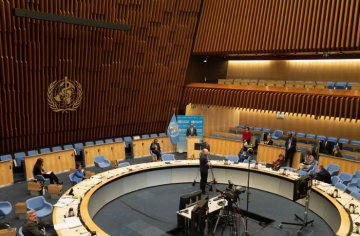BUENOS AIRES, May 20 (Xinhua) -- Work on the world's southernmost hydroelectric dams, being built in Argentina's remote Santa Cruz Province as part of energy cooperation with China, has helped kickstart the China-proposed Health Silk Road initiative in the region amid the COVID-19 pandemic.
Argentine electric engineering firm UTE Represas Patagonia and China Gezhouba Group Corporation joined forces to contain the spread of COVID-19 by distributing medical supplies donated or exported by China, and applying China's scientific and medical experience in this far-flung region close to the South Pole.
Since the outbreak of the pandemic, the province has received some 5,000 face masks, 1,000 disposable medical suits and 100 protective goggles from China, according to Mariano Musso, UTE's director of institutional relations.
"The characteristics and dimensions of our project turn the construction sites into temporary communities that are incorporated into the local healthcare system, that's why right healthcare planning and right attention to healthcare help to strengthen the public system, not overburden it," Musso told Xinhua.
"The supplies are being used in the areas of healthcare, security and education," Musso said.
This week, the province's ministry of health received 8,000 nasal swabs used to detect upper respiratory tract infections, and 5,000 test kits for COVID-19.
"These supplies are part of a larger donation that includes the elements to set up a laboratory that is to arrive in the coming months to expand our testing capacity in the province," said Musso.
The Health Silk Road is a facet of the China-proposed Belt and Road Initiative, which is aimed at improving regional integration, increasing trade and stimulating growth of the countries along and beyond the Silk Road Economic Belt and the 21st-century Maritime Silk Road. It aims to promote international cooperation in the realm of healthcare.
In conjunction with the distribution of medical supplies, local health authorities had a chance to confer with Chinese medical experts in the city of Yichang in central China via videoconference, thanks to the arrangement made by the Chinese embassy in Argentina.
"Chinese doctors shared their knowledge and experience with officials from the province's ministry of health, directors of hospitals in the province, and UTE's medical team," said Musso.
Santa Cruz Province Health Minister Juan Carlos Nadalich took part in the videoconference, which delved into all aspects of the pandemic, from diagnosis to treatment.
Global health cooperation is not only "fundamental" to overcoming the current health crisis, but will bolster the world's ability to tackle other public health challenges and improve the wellbeing of the general public, Musso said.

















Latest comments